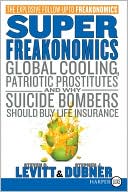List Books » SuperFreakonomics: Global Cooling, Patriotic Prostitutes, and Why Suicide Bombers Should Buy Life Insurance
Category Books
- Fiction Books & Literature
- Graphic Novels
- Horror
- Mystery & Crime
- Poetry
- Romance Books
- Science Fiction & Fantasy
- Thrillers
- Westerns
- Ages 0-2
- Ages 3-5
- Ages 6-8
- Ages 9-12
- Teens
- Children's Books
- African Americans
- Antiques & Collectibles
- Art, Architecture & Photography
- Bibles & Bible Studies
- Biography
- Business Books
- Christianity
- Computer Books & Technology Books
- Cookbooks, Food & Wine
- Crafts & Hobbies Books
- Education & Teaching
- Engineering
- Entertainment
- Foreign Languages
- Game Books
- Gay & Lesbian
- Health Books, Diet & Fitness Books
- History
- Home & Garden
- Humor Books
- Judaism & Judaica
- Law
- Medical Books
- New Age & Spirituality
- Nonfiction
- Parenting & Family
- Pets
- Philosophy
- Political Books & Current Events Books
- Psychology & Psychotherapy
- Reference
- Religion Books
- Science & Nature
- Self Improvement
- Sex & Relationships
- Social Sciences
- Sports & Adventure
- Study Guides & Test Prep
- Travel
- True Crime
- Weddings
- Women's Studies
SuperFreakonomics: Global Cooling, Patriotic Prostitutes, and Why Suicide Bombers Should Buy Life Insurance » (~)

Authors: Steven D. Levitt, Stephen J. Dubner
ISBN-13: 9780061927577, ISBN-10: 0061927570
Format: Paperback
Publisher: HarperCollins Publishers
Date Published: October 2009
Edition: ~
Author Biography: Steven D. Levitt
Steven D. Levitt is a professor of economics at the University of Chicago and a recipient of the John Bates Clark Medal, awarded to the most influential economist under the age of forty.
Book Synopsis
The New York Times best-selling Freakonomics was a worldwide sensation, selling over four million copies in thirty-five languages and changing the way we look at the world. Now, Steven D. Levitt and Stephen J. Dubner return with SuperFreakonomics, and fans and newcomers alike will find that the freakquel is even bolder, funnier, and more surprising than the first.
Four years in the making, SuperFreakonomics asks not only the tough questions, but the unexpected ones: What's more dangerous, driving drunk or walking drunk? Why is chemotherapy prescribed so often if it's so ineffective? Can a sex change boost your salary?
SuperFreakonomics challenges the way we think all over again, exploring the hidden side of everything with such questions as:
- How is a street prostitute like a department-store Santa?
- Why are doctors so bad at washing their hands?
- How much good do car seats do?
- What's the best way to catch a terrorist?
- Did TV cause a rise in crime?
- What do hurricanes, heart attacks, and highway deaths have in common?
- Are people hard-wired for altruism or selfishness?
- Can eating kangaroo save the planet?
- Which adds more value: a pimp or a Realtor?
Freakonomics has been imitated many times over—but only now, with SuperFreakonomics, has it met its match.
Publishers Weekly
Economist Levitt and journalist Dubner capitalize on their megaselling Freakonomics with another effort to make the dismal science go gonzo. Freaky topics include the oldest profession (hookers charge less nowadays because the sexual revolution has produced so much free competition), money-hungry monkeys (yep, that involves prostitution, too) and the dunderheadedness of Al Gore. There’s not much substance to the authors’ project of applying economics to all of life. Their method is to notice some contrarian statistic (adult seat belts are as effective as child-safety seats in preventing car-crash fatalities in children older than two), turn it into “economics” by tacking on a perfunctory cost-benefit analysis (seat belts are cheaper and more convenient) and append a libertarian sermonette (governments “tend to prefer the costly-and-cumbersome route”). The point of these lessons is to bolster the economist’s view of people as rational actors, altruism as an illusion and government regulation as a folly of unintended consequences. The intellectual content is pretty thin, but it’s spiked with the crowd-pleasing provocations—“'A pimp’s services are considerably more valuable than a realtor’s’” —that spell bestseller. (Nov.)
Table of Contents
An Explanatory Note xiii
Introduction: Putting the Freak in Economics 1
1 How Is a Street Prostitute Like a Department-Store Santa? 26
2 Why Should Suicide Bombers Buy Life Insurance? 81
3 Unbelievable Stories About Apathy and Altruism 139
4 The Fix Is in-and It's Cheap and Simple 190
5 What Do Al Gore and Mount Pinatubo Have in Common? 235
Epilogue: Monkeys Are People Too 301
Acknowledgments 309
Notes 313
Subjects
 Economics
Economics  Economic Theory & Schools of Thought
Economic Theory & Schools of ThoughtBusiness Books
 Economics
Economics  Economics - General & Miscellaneous
Economics - General & MiscellaneousNonfiction
 Social Sciences
Social Sciences  Sociology
SociologyNonfiction
 Sociology
Sociology  Economic Sociology
Economic SociologyScience & Nature
 Social Sciences
Social Sciences  Sociology
SociologySocial Sciences
 Sociology
Sociology  Economic Sociology
Economic Sociology
